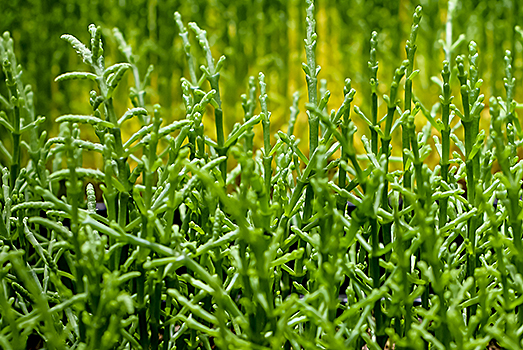Desert provides an oasis for KAUST bioscientist studying plant stress

Dr. Xiong is looking for an integrated solution to improve plant drought tolerance. Photo courtesy of Linda Polik
Dr. Liming Xiong, Associate Professor in KAUST's Biological and Environmental Sciences & Engineering Division, studies how plants grow under drought conditions where the climate is hot and the supply of water is limited. He has been with KAUST since 2009 and seeks answers to three related questions: how do plants reduce their water consumption; how do plants increase their uptake of water; and how do plants survive under stress.
We spoke to Dr. Xiong about what he calls his “whole plant” approach to learn more about how he's looking for an integrated solution to improve plant drought tolerance.
What is the most compelling or significant aspect of your research?
Plants can encounter many different kinds of stress such as extreme temperatures, high soil salinity and drought. These stresses may occur at the same time and plants may employ similar mechanisms to deal with these different stresses. At KAUST, we are particularly interested in looking at how plants respond to drought -- and their drought tolerance mechanisms. This research is important as drought stress is widespread and can seriously reduce crop yield. It’s a challenging issue for the scientific community.
There are several strategies that plants take to adapt to limited water conditions. The first strategy plants use is to reduce their water consumption. This is mainly accomplished by minimizing transpiration through the leaves. The second strategy is to increase the take-up of water, mainly by growing longer roots that can reach deeper to where the water is. Because stress will lead to the accumulation of harmful compounds such as reactive oxygen species within the cells, plants will need to handle these harmful compounds. The strategy plants use is to activate the expression of many stress-responsive genes whose products directly or indirectly mitigate stress-induced damages.
To reveal the mechanisms of plant drought tolerance, we are conducting research in all of the above-mentioned areas with the aim to identify major genes that control water uptake, water loss and cellular detoxification. We believe this whole-plant, integrative approach will allow us to uncover the major mechanisms of plant drought tolerance.
Why is your research important to the Kingdom of Saudi Arabia?
The biggest issue for agriculture here in Saudi Arabia is the lack of water. It’s thus important for us to find ways to develop plants that can use water more efficiently (consume less water per unit of produce) or can be irrigated with brackish water. Knowing the molecular mechanisms and genetic basis of plant drought and salt tolerance will greatly help the breeding or bioengineering of the stress-tolerant crop plants potentially suitable for the conditions in the Kingdom.
What will be the next step in your research?
Earlier I described the three-strategies plants use to adapt to drought stress. What we have been doing is looking for the genes that control each of these adaptive processes. We have now found a number of genes and our next step is to understand how these genes work in regards to water loss, water uptake and stress tolerance. In the meantime, we are confirming in the lab that those genes are really important and play a major part in each of the process. The work was large scale relative to the small size of our lab and could not have been done anywhere but here in the Kingdom at KAUST.
Once we have the important genes and understand how they work, it will be relatively easy to breed and genetic engineering stress-tolerant crop plants. The technology is already there and we’ll use it to do what we call “proof of concept” experiments in the lab. If that is successful then we can move to the next step. But right now, we need to do a lot of preliminary research. It could be many years of research before we could use the knowledge to enhance drought tolerance of crop plants.
- By Michelle Ponto, KAUST News

